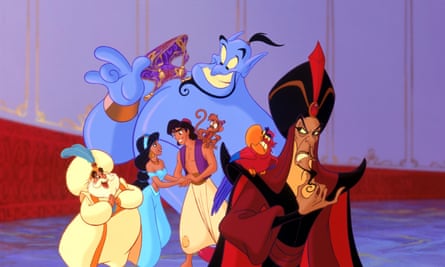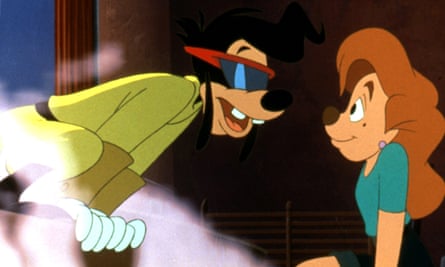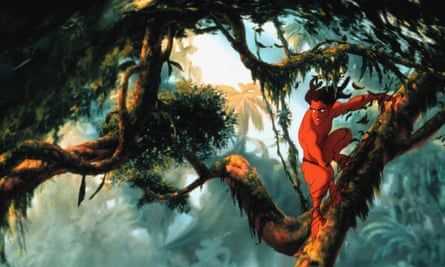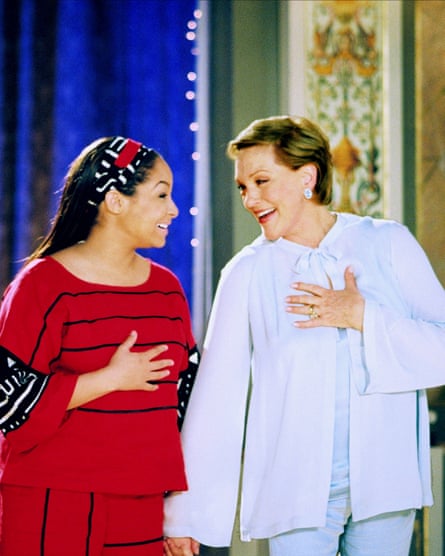Bare Necessities (The Jungle Book, 1967)
“Look – for – the” – and then the pub-piano thump of that first chord triggers a singalong reflex I’ve been unable to suppress these 50 years – “bare necessities, the simple bare necessities / Forget about your worries and your strife!” The Dixieland parp of brass and jangle of banjo strings, with Phil Harris’s easygoing delivery, lasered into my seven-year-old mind. Baloo’s classic song to Mowgli from the 1967 classic The Jungle Book advocates the good life, the easy life, a radical Zen refusal of possessions: “When you find out you can live without it and go along without thinkin’ about it!”
It’s the manifesto of laidback acceptance, which surely inspired Hakuna Matata in The Lion King, but very different from the icy aspirational defiance of Let It Go in Frozen. When my sister and I were little kids we had the vinyl EP, which we played incessantly on my mum and dad’s ancient record player: singing along uncomprehendingly to the outrageous rhymes (“recipes”, “rest-at-ease”) and those baffling lyrics about the pawpaw and the prickly pear. (Before being able to rewatch videos – Disney didn’t release films on VHS until 1984 – or look it up on YouTube, we couldn’t remember what it all referred to.) Now I’ve got Bare Necessities in my head for the rest of the day, not that it’s ever far from my mind. Peter Bradshaw
The Siamese Cat Song (The Aristocats, 1970)
According to Discogs.com, Ronco’s Greatest Hits of Walt Disney album came out in 1975: I would have been four or five when my parents bought it. It didn’t have the desired effect. Excerpted from films I hadn’t seen, complete with dialogue, every song on it was either completely bewildering or genuinely frightening: the latter category, in which Heigh Ho and, for some reason, Whistle While You Work figured heavily, reached a peak of horror with The Siamese Cat Song, which, as far as I could gather, seemed to be about drowning someone and doing something malevolent – I couldn’t figure out what – to a baby. So, it ruled my childhood in the same way that the theme music from Doctor Who or the unexpected appearance of the public information film The Spirit of Dark and Lonely Water during ad breaks on ITV did: a reign of terror. Alexis Petridis
Part of Your World (The Little Mermaid, 1989)
The Little Mermaid was my Frozen. I didn’t care for Barbie or princesses, just Ariel, a wily little outcast with miraculous hair. I was two-and-a-half when it hit VHS and it probably wasn’t ejected from the VCR for another two years, at least until my little brother was old enough to start making his own cinematic demands. Although I was the big sister, I was the baby at junior school, where I’d skipped a year, and would become tearful and angry at being referred to that way. I wanted to be big, and Part of Your World, like many of the biggest Disney songs, is about hungering to have your potential fulfilled.
The scene where you see Ariel’s cavern of “whozits and whatzits galore” is one of the most beautiful Disney animations, and her pride in them chimed with a fledgling age where you’re starting to build a sense of self through your own trinkets and toys. But Ariel wants even more than that – freedom, respect, knowledge. “Ask ’em my questions and get some answers / What’s a fire, and why does it – what’s the word – burn?” Jodi Benson sings, on fire with yearning. (Let’s ignore the fact that Ariel gives up her voice for a boy!) Growing up means growing out of The Little Mermaid, but I’ll still be at the multiplex in May, curious about what I hear in the new live-action version, 30 years on. Laura Snapes
Poor Unfortunate Souls (The Little Mermaid)
I was obsessed with mermaids as a child, and still am. (Do I own several of those swimmable tails? I wouldn’t like to say.) My first exposure to The Little Mermaid was via a VHS of the 1975 anime version, which retained the original ending, in which the mermaid chooses to kill herself rather than stab her prince to death. While Disney’s adaptation lacked this grit, it made up for it in musical numbers – the best being Ursula’s leitmotif, Poor Unfortunate Souls. Had my parents paid more attention to the fact that my favourite song was a burlesque number performed by a buxom octopus-woman based on Divine the drag queen, perhaps they could have saved me the trouble of coming out more than a decade later. And while there are arguments to be made against the queer-coding of Disney villains, as far as I’m concerned, Ursula imparted a valuable lesson. In a world of insipid princesses, be an unapologetic queen. Joe Stone
Prince Ali (Aladdin, 1992)

As a 10-year-old, I didn’t know any other boys who were absolutely obsessed by Aladdin. But did that stop me from learning every word of dialogue and replaying the VCR until the footage warped? Absolutely not. I’d just never seen anything like Robin Williams’ comedic masterclass of a performance as the genie. It just seemed so cool – I couldn’t believe that something so funny, so mesmerically charismatic could exist, and that the world was full of people who didn’t spend their whole lives talking about it.
Hence my fixation on the bassy brass pomp of Prince Ali. Williams’ vocals career through a riotous selection of character voices you’d expect to find in a high-octane standup set, as he attempts to claim that Aladdin is in fact a fabulously wealthy prince. From Noo Yoik drawl to squeaky child, he piles surreally comic lyrical boasts atop each other, be it championing the quality of his zoo (“I”m telling you, it’s a world-class menagerie!”) or extolling his rock-hard bod (“How can I speak? Weak at the knee!”). It’s a super-fun romp through wild woodwind flourishes, roaring choral backing and stop-start timpani (and one that was nominated for a Golden Globe). It also features what has to be the most hilariously weird backing vocal chant ever included in a Disney movie. All together now: “He’s got the monkeys! Oh yeah, the monkeys!” Alexi Duggins
Stand Out (A Goofy Movie, 1995)

My love for A Goofy Movie – a relatively obscure entry in Disney’s catalogue – is at this point inextricable from my personality. Growing up, I was obsessed with the video and its story of deep-seated insecurity and yearning to be seen (something to unpack in therapy, perhaps). Notably, the film’s soundtrack bangs, laying the foundations for my lifelong R&B fandom. Central to this is the character Powerline, a dog pop star modelled after a delicious blend of Bobby Brown, Michael Jackson and Prince (no, really).
Voiced by real-life New Jack Swing heartthrob Tevin Campbell, his hefty songs I2I and Stand Out were so impactful and euphoric that my childhood best mate and I still know all the words. Powerline oozes electricity and finesse, and while I2I is the heart of the film, there’s something about the sleek posturing of Stand Out that made me giddy as a kid. Performed during main character Max’s wild attempt at getting a girl’s attention, I still find its smirking spoken word and bold riffs tantalising and freeing, and hold it solely responsible for spending my 20s enamoured with the kind of men who wear sunglasses indoors. Tara Joshi
Zero to Hero (Hercules, 1997)
Whereas my sister was the kind of child who would happily plonk herself down in front of The Hunchback of Notre Dame for the 26th day in a row, my attention span has never withstood multiple viewings of the same film. I was, however, willing to watch Disney Sing-Along Songs on an almost daily basis: being both a lyrics person and my own insufferable taskmaster meant that trying to memorise the surprisingly wordy musical numbers of the Disney renaissance was very much my idea of fun.
The closer was a particular highlight: Zero to Hero from Hercules, a tongue-twisting, wittily anachronistic celebration of our protagonist (“person of the week in every Greek opinion poll!”) delivered via an ecstatically catchy gospel number performed with increasingly manic gusto by the Muses (played by five incredible female singers). Listening back 25 years on, I’m possibly even more taken with this beautifully made song which, like much great children’s entertainment, is far cleverer and funnier than it needs to be. In fact, I’ve found myself obsessively practising it all over again – and this time, I’m going to be word-perfect. Rachel Aroesti
I’ll Make a Man Out of You (Mulan, 1998)
I don’t remember what exactly sparked the popularity of Mulan’s I’ll Make a Man Out of You at secondary school – all I know is that the song became a quasi-anthem of sorts, its chorus semi-ironically chanted by just-about-teenagers already learning to love nostalgia’s balmy glow. It fit the mood: it was Hong Kong in the late 2000s, exams were on the horizon, and no one had any time or guile for puppy love. In the film, the song is set to a training montage showing a clumsy Mulan preparing for battle alongside her hapless friends. In the thick of the night, she decides to climb up a wooden pole – when day breaks, she is triumphantly at the very top. And so we found perverse comfort in its thundering chorus that promised self-actualisation through pain, which teased that through graft, the self could be made perfect, invulnerable, as mysterious as the dark side of the moon. Rebecca Liu
You’ll Be in My Heart (Tarzan, 1999)

Back in 1999, five-year-old Ammar was busy beginning to learn the drums. I was bashing away at a plastic kit, struggling to get control of my coordination while sounding like a brick being spun in a washing machine. Somehow, my parents encouraged me to keep going, but nothing would click – my tiny limbs were like foreign, flailing entities. I wanted to give up, until I saw Tarzan and heard Phil Collins belt out You’ll Be in My Heart over the credits.
I’m not sure I understood what was happening in the movie and I definitely wasn’t listening to Collins’ lyrics, but what imprinted itself on to my brain was his thumping groove, that soaring key change into the chorus, and a huge In the Air Tonight-worthy fill. I begged my parents for the soundtrack and found new purpose in my drumming – trying to keep up with the song on the stereo. Of course, it took me another couple of years before I could even play along in time, but those four minutes will always be my foundational rhythmic text. Twenty-four years on, I can play it in full – just about. Ammar Kalia
Your Crowning Glory (The Princess Diaries 2: Royal Engagement, 2004)

The Disney Channel was a hallowed treat that I could only watch when I had a playdate at a friend’s house; we only had Freeview at home, where I clung to any Disney films that trickled down to Film4. When I recorded The Princess Diaries 2 despite having never seen the first film, I instantly fell in love with this oddball hybrid of teen romcom and dynastic drama, and I would watch it – to my dad’s chagrin – over and over. The film generally favoured the headbanging tones of Lindsay Lohan over Disney’s signature ballads, but Your Crowning Glory was a curious exception. The duet between the ever-regal Julie Andrews and teen idol Raven-Symoné was, in hindsight, a baffling collision of Disney’s timelessness and its pop-driven ambitions.
Their royal sleepover offered my 12-year-old self a rosy promise of teenage girlhood with its matching pyjamas, fluffy slippers and karaoke. The generational back-and-forth between Andrews and Raven-Symoné is not a clash but a waltz, where the swooning piano and hip-hop beat are perfectly in step (take it from the guard shimmying along outside). But aside from being a portent of Disney’s chart-climbing designs, Your Crowing Glory was also a tender dedication to self-confidence, where each girl is “a jewel / With a singular shine / A work of art, with its own rare design.” It was a worthy message for a girl on the brink of her teenage years and an affectionate, playful moment of succession from one Disney queen to another. Sophie Walker

